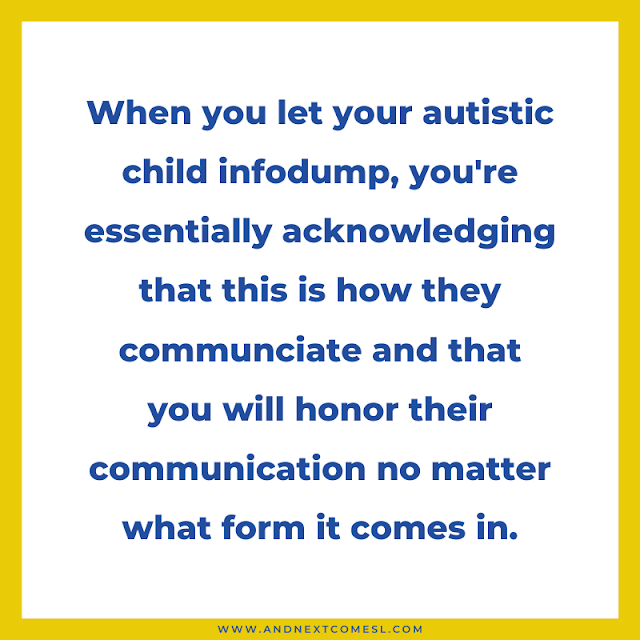Understanding various aspects of autistic culture is important, especially if you are raising or parenting an autistic child and want to have a supportive relationship with them.
Or even if you're a teacher with autistic students.
Or a therapist working with autistic clients.
Regardless, part of that learning process might involve learning about samefoods and special interests, for instance.
Or, in this case, learning about one of the neurodivergent love languages called infodumping, which, by the way, is closely related to special interests. The two go hand-in-hand.
Now, perhaps you've encountered the interesting conversation style of autistic infodumping before. And, presumably, you're curious to learn more about it. That's likely why you're here, right?
Well, let's take a closer look at what infodumping in autism is, how it's related to special interests, and why autistic people use this style of communication.
What is Infodumping in Autism?
Infodumping refers to the the autistic tendency to excitedly share a large amount of information about a highly-focused subject or passion at one time, usually in great detail and length.
In terms of detail, autistic people might attempt to share absolutely everything they know about the topic. It is worth noting that usually the topic is one of their special interests or something related to it. So, unsurprisingly, they know a lot about it.
What starts off as sharing one or two interesting facts may quickly snowball into sharing an entire textbook or Wikipedia entry's worth of information or more. As a result, the information shared during an infodump session is often quite detailed, in-depth, and exhaustive.
As for length, they may talk about the topic for long periods of times, even hours, regardless of the other person's interest level.
So quite often autistic people may miss body language changes or nonverbal cues from others that indicate that the other party is bored or not interested in the topic. This happens simply because they get so engrossed talking about it.
There is another term for infodumping that you may have seen before. Sometimes it's referred to as monologuing. Makes sense given that monologues are defined as long speeches delivered by a single person. So you may see these two terms used interchangeably in autistic spaces.
Why Do Autistic People Infodump?
It's important to know that infodumps are an authentic form of communication and conversation style for autistic people of all ages, even autistic kids.
In other words, it's a natural way for them to communicate because of its directness and focus on facts and logic.
For some, infodumping is also a love language. So it can be a way for autistic individuals to express what they are passionate about with those they care most about.
So why do autistic people infodump exactly? Well, there are a few reasons, including:
- To share their passion, joy, enthusiasm, and excitement
- To express themselves in a way that is authentic and natural
- To share knowledge and information, usually in great detail and length
- To build connections, bond, and communicate with others
- To make friends and/or find a sense of community
- To self-regulate
- To create a sense of pride
- To release a build up of thoughts that need expressing (i.e., they have an intense need to share their thoughts or else it feels like they may explode)
There are likely a handful of other reasons why infodumping is necessary for autistic people so keep in mind that this list is by no means exhaustive. However, as you can probably see, this style of communicating is valuable and beneficial for them in a lot of ways.
So Should You Encourage Your Autistic Child's Infodumping or Not?
Like a lot of autistic traits and elements of autistic culture, infodumping is misunderstood by a lot of people.
For instance, some therapists or professionals might tell you to discourage and redirect their monologues. Kind of like they do for a lot of things...So, too often, the autistic's urge to infodump is viewed as rude, self-absorbed, dominating, the list goes on and on.
The reality though is that infodumping is just one way that autistic individuals communicate and engage in conversations with others. It's how they connect. It's how they relate.
So the short answer is yes, you should encourage your child to infodump. After all, there are a lot of benefits to doing so.
When you allow your autistic child to infodump, you are showing them that you care about them and their special interests. It's just one way to encourage your child's special interests by the way. So be genuinely curious and a good listener while they're infodumping. Ask questions, if appropriate.
When you let your autistic child infodump, you are also validating and affirming what comes naturally to them.
Essentially, you're acknowledging that this is how they communicate and that you will honor their communication no matter what form it comes in. Kind of like you would or should with echolalia and scripting.
But what if your autistic child is non-speaking, what should you do? Can they even still infodump?
You bet they can. If you give them the tools to do so.
For instance, you could create a page of things dedicated to their special interests on their AAC device to encourage infodumping. This video from @nigh.functioning.autism has some great suggestions.
They may also engage in infodumping by writing their thoughts down in a book or journal, showing you a video or book, pointing to things, and so on.
Some Caveats & Final Thoughts on Infodumping
Now, having said all that, there are a few caveats and things to consider when it comes to infodumping. It's not like we can engage in all day conversations about Titanic's sinking or the many moons of Jupiter. In most cases, that's not realistic, maintainable, or even practical.
So you might have to consider setting some boundaries, like letting them infodump for a few minutes and then letting you respond for a few minutes. Or finding a different way to encourage them to infodump. They could try journaling or recording a video, for instance. Infodumping doesn't always have to be through spoken language.
You might also have to teach them how to engage when others are infodumping on them and they don't like the topic. Because that can happen too. So they might need help knowing what to do.
It might also be helpful to find your child a special interest group or an autistic friend whom they can infodump with. It's an amazing feeling to meet and connect with others who share the same enthusiasm as you do for certain topics. And they may be more accepting of infodumping as a result (at least compared to how most neurotypical people are).
Regardless, infodumping or monologuing is a valuable form of autistic communication that should be honored, acknowledged, and encouraged as much as possible. Not something to be just be automatically disregarded and redirected. That's not a great approach to anything really.
Anyway, I hope you learned a few things about infodumping in autism and now have a better understanding of why it's important to autistic individuals.













